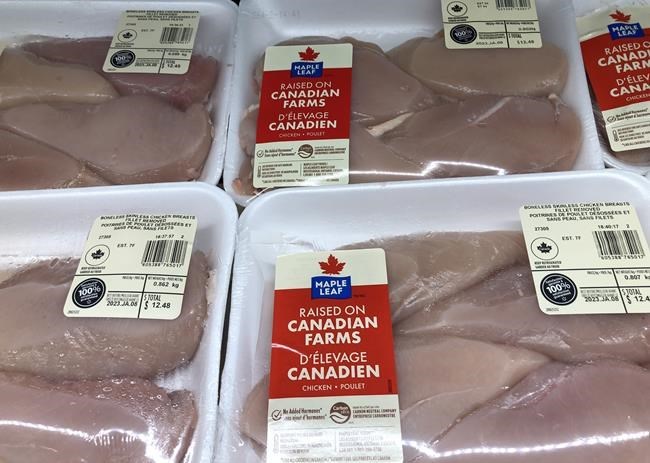MISSISSAUGA, Ont. β Maple Leaf Foods Inc. is combining its meat and plant protein businesses into one as it seeks to focus the company and drive growth.
βWe are pivoting to a new chapter, and it's a chapter that we expect to be lucrative for all Maple Leaf stakeholders,β said Maple Leaf CEO Curtis Frank on a conference call Thursday discussing the company's fourth-quarter earnings.
As part of the shift, the company announced an organizational shuffle that sees Adam Grogan promoted to the role of chief operating officer, while Casey Richards has been posted to the newly created job of president, Maple Leaf Foods USA.
RBC Dominion Securities analyst Irene Nattel said the change should streamline the company.
It's a "more accurate reflection of how plant and meat are currently operating, and of the anticipated growth of the segment," she said in a note.
The reorganization came as Maple Leaf reported a fourth-quarter loss of $9.3 million or eight cents per share for the quarter ended Dec. 31 compared with a loss of $41.5 million or 34 cents per share a year earlier.
The company said the improvement for the quarter was driven by pricing to mitigate inflation, stronger pork markets, and other factors.
Sales totalled $1.19 billion for the quarter, about the same as a year earlier.
Sales for the company's meat protein business amounted to $1.16 billion, up from $1.15 billion in the fourth quarter of 2022, while plant protein sales totalled $36.5 million, down from $40.0 million a year earlier.
Frank said in a news release that results for the meat protein business fell below expectations due to continuing challenges in the global pork market as well as "a challenging consumer demand environment."
Softening consumer behaviour contributed to softer results in prepared meats and poultry, he told investors, as inflation and higher interest rates continue to weigh on shoppers.
The unprecedented pork market conditions have persisted for longer than the company expected, Frank said.
But while the market conditions are continuing into the first quarter, "there is promising news on the horizon," he said. Global protein markets are expected to improve throughout 2024 and feed prices are declining.
"European production has been reduced, improving the global supply and demand balance, and pork continues to be affordable relative to other competitive proteins, setting up a favourable demand environment."
The company is also expecting more benefits to come through from investments in two facilities, its London Poultry Plant and its Bacon Centre of Excellence.
"We are bringing an end to an intense period of investment as we completed the build-out of our world-class network and have now started our path to deleveraging the balance sheet as we move into our next phase," Frank said.
The company achieved the goal it had set for its plant protein business in 2023: for adjusted earnings before interest, taxes, depreciation and amortization to be neutral or better.
On an adjusted basis, Maple Leaf said it earned eight cents per share in its latest quarter compared with an adjusted loss of 28 cents per share in the fourth quarter of 2022.
Maple Leaf's loss for the full financial year also narrowed, coming in at $125 million compared with $311.9 million in 2022.
The company also has a new chief financial officer as of the end of January. David Smales took on the role after Geert Verellen decided to step down.
Maple Leaf said it expects low- to mid-single digit revenue growth in 2024, with an expanded EBITDA margin supported in part by growth, return on capital investments, and profitable growth in plant protein.
This report by The Canadian Press was first published Feb. 22, 2024.
Companies in this story: (TSX:MFI)
Rosa Saba, The Canadian Press
Note to readers: This is a corrected story. An earlier version reported an incorrect number for meat protein sales.




